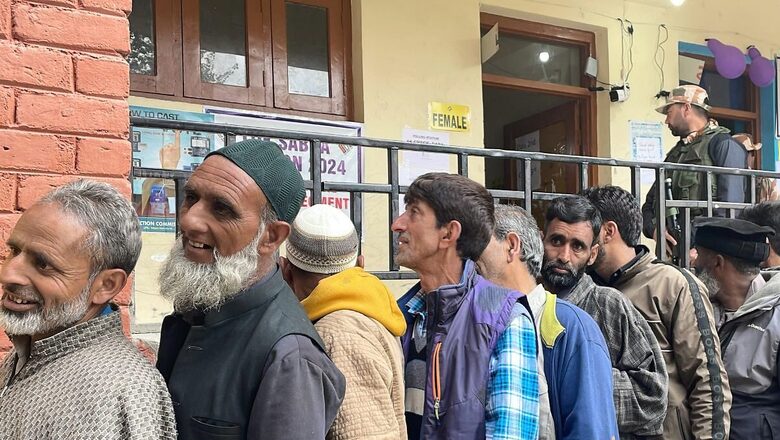
views
In a significant display of democratic participation, voters in Kashmir turned out in large numbers to cast their ballots peacefully during the recent elections, expressing a collective hope for the continuity of Prime Minister Narendra Modi’s leadership, often referred to as ‘Modi 3.0’. The elections, which witnessed robust voter engagement across various constituencies in the region, reflect a growing sentiment of optimism and trust in the leadership of the current government.
In the Union Territory of Jammu and Kashmir, the fourth phase of voting for general elections to the 18th Lok Sabha concluded recently with 36.58 per cent voting in the districts of Srinagar, Ganderbal, Pulwama, and Budgam and Shopian districts partly. Polling took place in 2,135 stations across the Srinagar parliamentary constituency, with live webcasting at all the polling stations.
Amidst heightened security measures and a backdrop of historical political complexities, Kashmiris braved various challenges to exercise their democratic rights. Reports from polling stations across the region highlighted the orderly conduct of the electoral process, with voters patiently queuing up to cast their votes.
Voters across Srinagar, Budgam, Ganderbal, Pulwama, and Shopian turned out in unprecedented numbers, demonstrating their trust and enthusiasm in the electoral process. This election marked the valley’s first general election following the revocation of Article 370 and the enactment of the Jammu and Kashmir Reorganisation Act, 2019. Notably, this election saw 24 candidates contesting, a significant increase from the 12 candidates in the 2019 general election. Polling officials and security personnel dedicated themselves to creating a welcoming and secure environment at polling stations, ensuring a smooth voting experience.
Speaking to local media outlets, several voters expressed their aspirations for a stable and prosperous future under the leadership of Prime Minister Modi. Many cited the government’s initiatives aimed at promoting development, infrastructure, and job creation in the region as key factors influencing their voting decisions.
Over the past few elections, the gross voter turnout has varied significantly. In 1996, turnout was recorded at 40.94 per cent. However, it decreased sharply in the 1998 elections to 30.06 per cent. It then fell further in 1999, reaching 11.93 per cent. This trend contrasts with the 2004 elections, which saw a comparatively higher turnout of 18.57 per cent. It then increased again to a similar level in 2009 and 2014, reaching 25.55 per cent and 25.86 per cent respectively, marking a high point in voter participation. However, the 2019 elections saw a significant decrease in turnout, falling to a low of 14.43 per cent. These variations underscore the dynamic nature of voter engagement across different election cycles, influenced by various socio-political factors and regional dynamics.
The peaceful conduct of elections in Kashmir also drew praise from national and international observers, underscoring the resilience of democracy in the face of adversity. The turnout, particularly in areas previously affected by unrest, signalled a desire for peace, stability, and inclusive growth among the populace.
Over 8,000 polling personnel were deployed to facilitate voting for over 17.47 lakh eligible voters. To guarantee free, fair, and inducement-free elections, command and control centres in both Srinagar and Jammu have operated around the clock since the announcement of the 2024 General Elections on March 16. Every polling station was equipped with essential amenities, including water, electricity, restrooms, ramps, verandas, and waiting areas. Wheelchairs and volunteers were readily available for those who needed assistance. To promote inclusivity, polling stations managed by women, persons with disabilities, and young people were established. Additionally, 21 eco-friendly polling stations were set up. Media access was provided through passes issued to over 600 journalists.
Political analysts interpreted the high voter turnout as a significant endorsement of the policies and leadership of the Modi government, with many anticipating a continuation of its agenda for the region. The results of the elections are expected to shape the political landscape in Kashmir and contribute to ongoing efforts towards peace, development, and reconciliation.
The Election Commission enabled Kashmiri migrant voters residing at various relief camps in Delhi, Jammu, and Udhampur to also have the option of voting in person at designated special polling stations or using postal ballots. 21 special polling stations were established in Jammu, one in Udhampur, and four in Delhi.
As the results are awaited, the participation of Kashmiri voters stands as a testament to their commitment to democracy and their aspirations for a brighter future. Regardless of political affiliations, the turnout reflects a collective yearning for progress, stability, and prosperity under the leadership of Prime Minister Narendra Modi, signalling the dawn of ‘Modi 3.0’ in the hearts and minds of the people of Kashmir.
Planned, consistent, and targeted interventions to promote voter awareness as part of SVEEP activities have contributed to the noteworthy rise in voter turnout.
The author is ex-Member of Parliament, Rajya Sabha. Views expressed in the above piece are personal and solely those of the author. They do not necessarily reflect News18’s views.




















Comments
0 comment